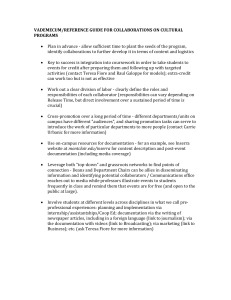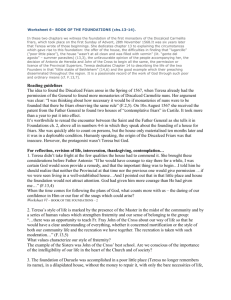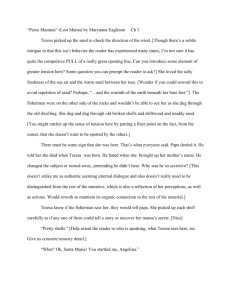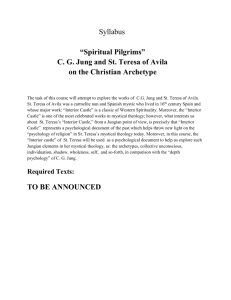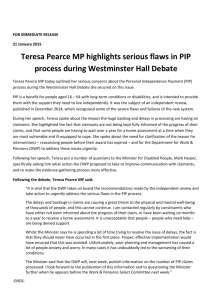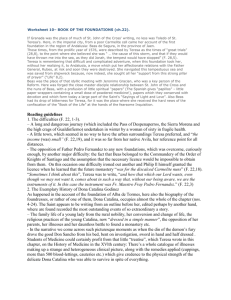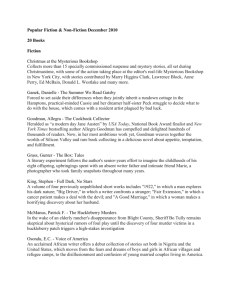Worksheet 11
advertisement
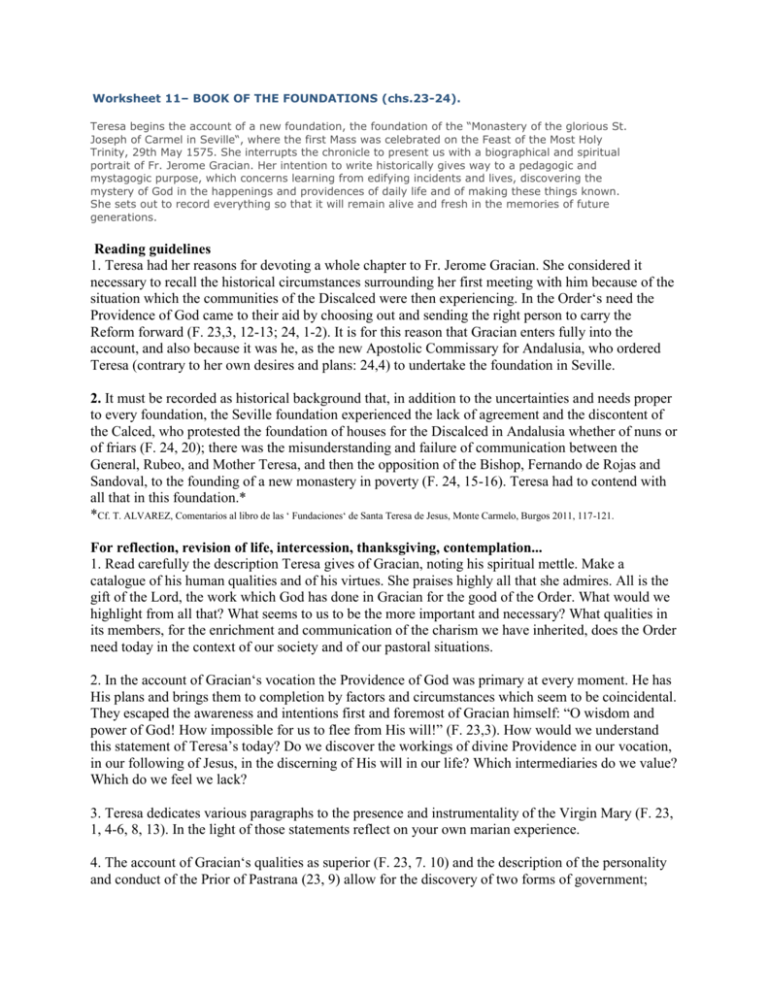
Worksheet 11– BOOK OF THE FOUNDATIONS (chs.23-24). Teresa begins the account of a new foundation, the foundation of the “Monastery of the glorious St. Joseph of Carmel in Seville“, where the first Mass was celebrated on the Feast of the Most Holy Trinity, 29th May 1575. She interrupts the chronicle to present us with a biographical and spiritual portrait of Fr. Jerome Gracian. Her intention to write historically gives way to a pedagogic and mystagogic purpose, which concerns learning from edifying incidents and lives, discovering the mystery of God in the happenings and providences of daily life and of making these things known. She sets out to record everything so that it will remain alive and fresh in the memories of future generations. Reading guidelines 1. Teresa had her reasons for devoting a whole chapter to Fr. Jerome Gracian. She considered it necessary to recall the historical circumstances surrounding her first meeting with him because of the situation which the communities of the Discalced were then experiencing. In the Order‘s need the Providence of God came to their aid by choosing out and sending the right person to carry the Reform forward (F. 23,3, 12-13; 24, 1-2). It is for this reason that Gracian enters fully into the account, and also because it was he, as the new Apostolic Commissary for Andalusia, who ordered Teresa (contrary to her own desires and plans: 24,4) to undertake the foundation in Seville. 2. It must be recorded as historical background that, in addition to the uncertainties and needs proper to every foundation, the Seville foundation experienced the lack of agreement and the discontent of the Calced, who protested the foundation of houses for the Discalced in Andalusia whether of nuns or of friars (F. 24, 20); there was the misunderstanding and failure of communication between the General, Rubeo, and Mother Teresa, and then the opposition of the Bishop, Fernando de Rojas and Sandoval, to the founding of a new monastery in poverty (F. 24, 15-16). Teresa had to contend with all that in this foundation.* *Cf. T. ALVAREZ, Comentarios al libro de las ‘ Fundaciones‘ de Santa Teresa de Jesus, Monte Carmelo, Burgos 2011, 117-121. For reflection, revision of life, intercession, thanksgiving, contemplation... 1. Read carefully the description Teresa gives of Gracian, noting his spiritual mettle. Make a catalogue of his human qualities and of his virtues. She praises highly all that she admires. All is the gift of the Lord, the work which God has done in Gracian for the good of the Order. What would we highlight from all that? What seems to us to be the more important and necessary? What qualities in its members, for the enrichment and communication of the charism we have inherited, does the Order need today in the context of our society and of our pastoral situations. 2. In the account of Gracian‘s vocation the Providence of God was primary at every moment. He has His plans and brings them to completion by factors and circumstances which seem to be coincidental. They escaped the awareness and intentions first and foremost of Gracian himself: “O wisdom and power of God! How impossible for us to flee from His will!” (F. 23,3). How would we understand this statement of Teresa’s today? Do we discover the workings of divine Providence in our vocation, in our following of Jesus, in the discerning of His will in our life? Which intermediaries do we value? Which do we feel we lack? 3. Teresa dedicates various paragraphs to the presence and instrumentality of the Virgin Mary (F. 23, 1, 4-6, 8, 13). In the light of those statements reflect on your own marian experience. 4. The account of Gracian‘s qualities as superior (F. 23, 7. 10) and the description of the personality and conduct of the Prior of Pastrana (23, 9) allow for the discovery of two forms of government; something of the “ideal“ and a disfigurement of the ideal. Discuss the subject and the reasons and conclusions given by Teresa and compare them with your experience in exercising authority (in those responsibilities which concern you) or in your theological response to the authority which others exercise as a service in the Church. 5. After writing those long paragraphs, making known Gracian‘s history and personal matters, Teresa justifies herself (F. 23, 11-13). She has her reasons for recalling it. Reflect on the importance of memory and the importance of recording it. Compare this with our way of understanding, living and transmitting the charism which we have received from God, whatever our state in life. This reflection could bring us to a moment of prayer and praise. 6. In a spirit of faith Teresa gave way to the requirements of the new Apostolic Commissary for Andalusia. She gave up the foundation of Caravaca (contrary to her opinion, personal revelations and desires) and obeyed Gracian (F. 24,4). Share your difficulties in discerning the will of God, in recognising and obeying God through His intermediaries. 7. St. Teresa writes about the foundations telling of the difficulties and adventures of the journeys. She does this with a good deal of freshness and humour (F. 24,5ff). There is no lack of anecdotes drawn from those eight days on the road to Seville. Added to them was the “more than a month“ of waiting for the licence to make the foundation, a gruelling delay endured with patience in the most arduous days of the Andalusian summer*. However Teresa never loses the opportunity of drawing out some lesson from an experience, of making some application to the spiritual life, or of finding some motivation there for discovering the Providence and Presence of God Himself. What have you discovered in these two chapters? Use for meditation and sharing: “His Majesty always gives trials in a compassionate way“ (F. 24,11). 8. Teresa speaks highly of the Sisters she took with her as foundresses. The tried virtue of her nuns inspired her with confidence and strength. Are we receptive to and grateful for the qualities and virtues of others? Do we feel ourselves to be sustained , edified, stimulated by the members of the community? Do we know how to share ideals, tasks and responsibilities, having confidence in the others? What attitudes and virtues should we cultivate more, so as to live our fraternity and mutual confidence in our community or family projects? *The reading of this foundation can be complemented by the detailed and pleasing description in Tiempo y vida de Santa Teresa (The Life and Times of St. Teresa) by Fr. Efren de la Madre de Dios and O. Steggink, BAC, Madrid 1968, p. ll, nos. 386-411.
